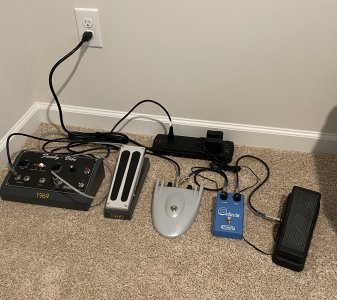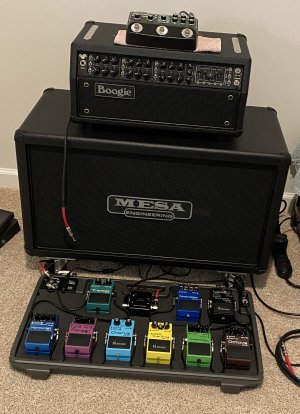Quite a wad of cash for a one-effect-at-a-time pedal. I know the sounds are professional and absolutely pristine, but it seems overpriced, also considering that there's "premium" algos that you'll only get when you upgrade or buy the MAX version.
It's certainly an expensive pedal.
But so is having more than one tube amp/cab instead of a modeler. So is having more than one guitar. I do both of those things, too.
Once you have one 'Max' pedal, it's free on any other H9s you own. I had one additional one but gave it to my son for some tours and recording; it was also upgraded to Max for free. His gets daily use.
I'm not looking for 'bang for buck'. I just want stuff that does what I need. I make a living at music, and can easily justify the expense.
I used an Eventide H3000 d/se in my studio for many years before going 'in the box'. I paid $3000 for it in 1992, and used it on every project, both with guitar, and on other tracks, like vocals.
The H9's algorithms are based on the H3000. I loved the algorithms then, and I still do. So that's why I've got the H9s. I got them before the H90 came out, I'd only need one of those.
On another note, Eventide was the company that prohibited
@Tom Von Kramm naming one of his creations (I'm 100% sure it was a
fuzz) "Rose" because of their upcoming "Rose"
delay.
Goons, imho.
Before getting into the music business I went to law school and practiced for several years. My friends still think of me as a lawyer, even though I went full time into music 34 years ago. In fact, I'm occasionally stuck guest-lecturing about the practicalities of music rights at the University of Michigan School of Music and University of Detroit Law School.
Truth: Once you pass the bar and practice law, you can
never get the stink off!!

Under the trademark laws, once you register a trademark, you're required to defend it against others in the same industry using the trademark. Sometimes that can be overkill, but if you don't, you risk losing the trademark's exclusivity.
A question that comes up in every case is, "What did you do to enforce this trademark in the past?", so in this case it would be, "But you let another pedal called the "Rose" in the music industry keep that name, didn't you?" A case can turn on that. Stupid as it sounds.
This was one reason, incidentally, that Gibson lost their trademark case against PRS' Singlecut. Gibson hadn't enforced the "trade dress" of the shape of their guitar (there were also other reasons).
Generally, trademark enforcement is done for products in the same industry, not necessarily with the exact same use (i.e., whether it's delay vs fuzz doesn't matter).
So in general, corporate counsel will warn a client, "You have to enforce this trademark if another company or individual is using it, no matter what." Companies will generally comply.
Let's say a company has significant dollars invested in an upcoming product release, advertising campaign, photography, brochure printing, silk-screening, boxes, and so on. We're talking about lots of money, potentially.
If they don't enforce the trademark, and another other party claims it first, say, under a state common law trademark theory, the company stands to lose the entire amount they've invested into the advertising and so on, plus lose the trademark, plus pay the other side's attorneys' fees (mandatory under intellectual property law).
The risks are too high not to enforce the trademark, simple as that.
Very few people are ever happy about it - on either side of the case - unless they're gluttons for litigation like Gibson.
One more interesting side note: Section 8 of Article 1 of the original (1787) US Constitution gave Congress the mandate to create intellectual property laws; none of this is new, even if it occasionally gets confusing, even to lawyers.
I'll add one more note in this edit:
The safe thing to do before naming a product is to search for registered trademarks in the national database - it's free - and in whatever states one might be concerned about, since there are also state trademark laws that apply to things mostly not in interstate commerce.
If the trademark is in use, avoid it. If it's not in use, or has expired, register it yourself to protect your right to use it.
Also, I'm very far out of the loop when it comes to this stuff - it's been a long time. So this isn't legal advice, it's just me spouting off opinions!












